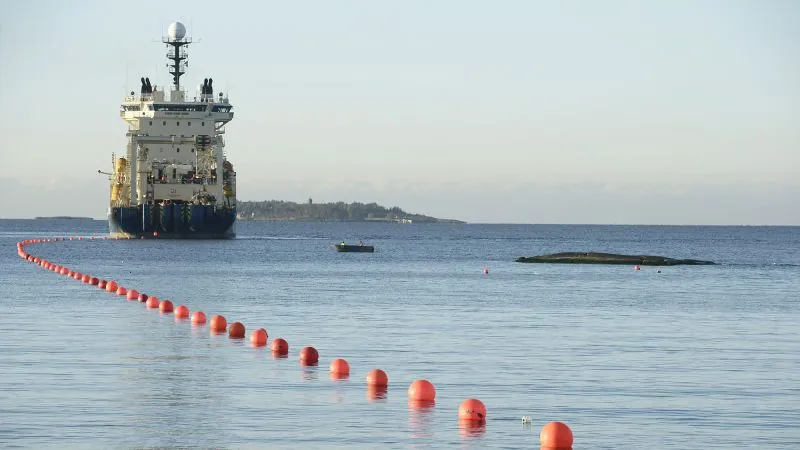
Sabotage or Accidental Damage? Baltic Sea Internet Cables Cut, Speculations Point to Russia
2024-11-20
Author: Chun
Introduction
In a concerning development for European cybersecurity, two submarine internet cables in the Baltic Sea were severed under suspicious circumstances, reigniting fears of potential sabotage, particularly from Russia. The disruption comes on the heels of U.S. warnings about Moscow's intent to target critical underwater infrastructure.
Details of the Incident
On Sunday, a cable linking Lithuania and Sweden was reported cut by Telia Lithuania, a major telecommunications provider. The very next day, Cinia, a Finnish state-controlled telecom company, announced that one of its cables connecting Finland to Germany was disrupted as well. This has prompted an urgent response, with both the Swedish and Finnish authorities opening investigations into the incidents, which they suspect may involve intentional sabotage.
Government Reactions
Boris Pistorius, Germany's Defense Minister, stated candidly, "Nobody believes that these cables were accidentally severed." His words align with concerns raised by Finland's Foreign Minister about the potential for these incidents to represent a form of "hybrid warfare," a term referring to tactics that blend conventional and unconventional methods to achieve political objectives without direct confrontation.
Speculations about Russia's Role
While European officials are pointing fingers at Russia, U.S. sources suggest there has so far been no definitive proof of a malicious act. An initial assessment indicates that the disturbances might not have been a deliberate attack but could have arisen from incidental factors, such as a vessel’s anchor dragging across the seafloor. However, tracking data does reveal ship movements near the cut cables, further complicating the narrative.
Increased Tensions and Concerns
This incident fits into a broader pattern of heightened Russian activity near crucial undersea infrastructures, which includes a litany of similar events reported in the region. Notably, the Russian military's secretive marine unit, the GUGI, has increasingly positioned itself near critical maritime installations, leading to mounting suspicions of reconnaissance operations aimed at potential sabotage.
Hybrid Warfare Tactics
In recent months, European security experts have been on high alert as Russia engages in what they term "hybrid warfare," employing tactics like cyberattacks, fertilizer plant explosions, and random arson incidents across various nations. Such actions are viewed as efforts by Moscow to exert psychological and operational pressure without triggering a military response from NATO, which is bound by mutual defense agreements.
Implications of the Undersea Cable Cuts
The undersea cable cuts have raised alarm bells not merely because they threaten internet connectivity across multiple nations but because they are indicative of a further escalation in a geopolitical landscape already fraught with tension due to the Ukraine conflict. Experts believe these moves by Russia could aim to leverage the dysfunction caused by the war, pushing allied nations to reconsider their foreign policies.
Lack of Direct Evidence
While investigations continue, there remains a lack of clear evidence linking Russia directly to the cuts, leading some analysts to argue that these actions are based on deniability—a tactic the Kremlin has famously perfected. This method allows Russia to maintain plausible deniability while still achieving its strategic objectives.
Conclusion
As the international community monitors the situation, the full consequences of the cable disruptions remain unclear. Normally, such incidents generate limited disruptions as telecommunications companies utilize redundant pathways for data transfer. However, any escalation in attacks on infrastructure could have serious long-term implications for European security and its economic stability. In conclusion, as European officials brace for the implications of these incidents, the tension surrounding the Baltic Sea continues to serve as a stark reminder of the vulnerabilities faced in an increasingly unpredictable geopolitical climate. With ongoing investigations and international scrutiny, the true motives behind these cable cuts remain shrouded in mystery, suggesting that this story is just beginning to unfold.




 Brasil (PT)
Brasil (PT)
 Canada (EN)
Canada (EN)
 Chile (ES)
Chile (ES)
 España (ES)
España (ES)
 France (FR)
France (FR)
 Hong Kong (EN)
Hong Kong (EN)
 Italia (IT)
Italia (IT)
 日本 (JA)
日本 (JA)
 Magyarország (HU)
Magyarország (HU)
 Norge (NO)
Norge (NO)
 Polska (PL)
Polska (PL)
 Schweiz (DE)
Schweiz (DE)
 Singapore (EN)
Singapore (EN)
 Sverige (SV)
Sverige (SV)
 Suomi (FI)
Suomi (FI)
 Türkiye (TR)
Türkiye (TR)